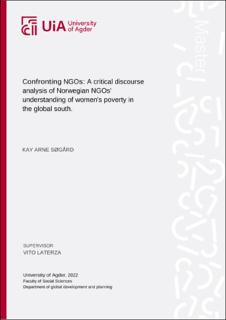| dc.description.abstract | Norwegian NGOs are organizations that are highly visible in the media in Norway regarding development and aid. With such a prominent place in the media and enormous visibility, these organizations influence the population in Norway with their knowledge production. There is little research into how Norwegian NGOs frame the issue of women's poverty in the global south and how this framing creates practical development interventions.
This qualitative research examines how the NGO frames women's poverty through a thematic analysis of interviews that maps the discourse of poor women in the global south and how these framings reflect the development interventions. A critical discourse analysis of documents produced by the NGOs is conducted to reveal the discourses in play when framing poor women and interventions. The analysis findings are then discussed through different theories, several of which deal with power relations. Foucault's theory of genealogy of power is used to discuss the findings in the analysis.
Through this analysis, it becomes clear that the NGOs frames poor women as women who lack skills, are ignorant and backward, and consist of women of reproductive age who live in rural areas. The discourses that are in play with the NGOs when they frame poor women and development are discourses such as neo-Malthusian discourse, neoliberalism, classical modernization discourse, and globalization discourse. These discourses can influence the interventions and have unfortunate consequences, such as increased marginalization of women. | |
